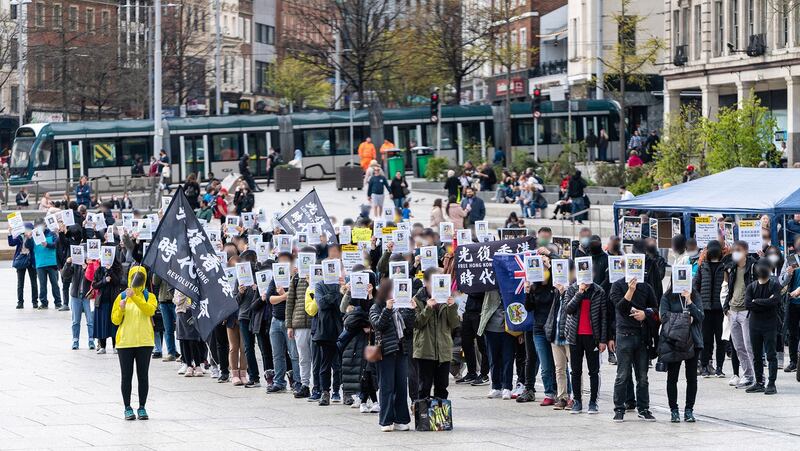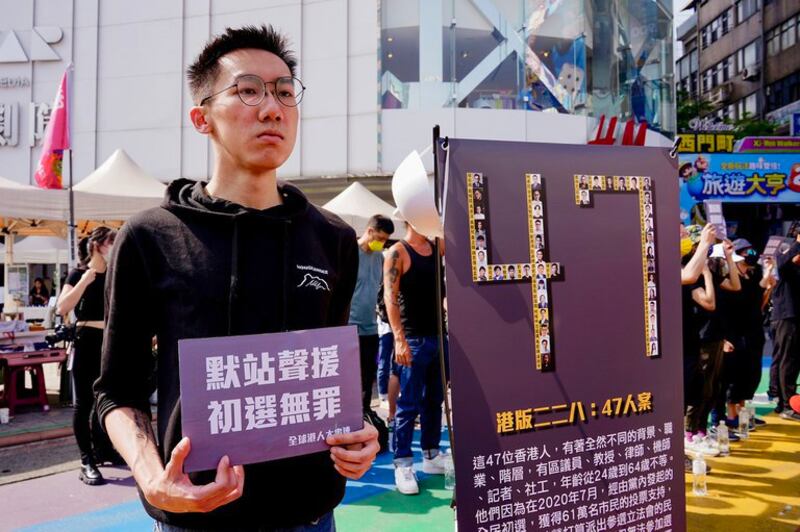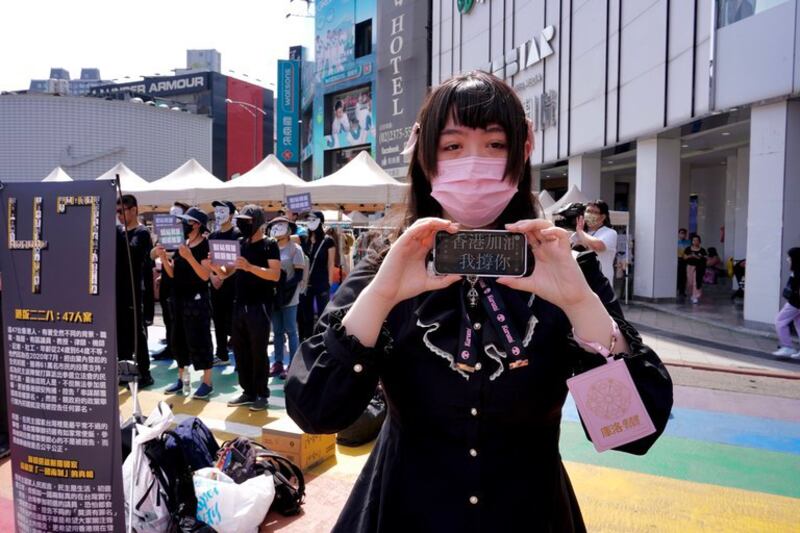Hundreds of Hong Kongers and other supporters turned out in rallies around the world over the weekend to show solidarity with 47 former opposition lawmakers and political activists currently standing trial for "subversion" under a national security law imposed on the city by Beijing.
Demonstrators gathered in cities across the United States, Britain and Taiwan in protests that also aimed to warn global governments of the threats posed by Beijing's attempts to push its authoritarian model of government far beyond China's borders.
In San Francisco, protesters sang the 2019 protest song "Glory to Hong Kong" – banned under the national security law – and wrote letters and cards to the 47 defendants, who include former journalist Gwyneth Ho, a 2019 protest movement activist, former nursing student Owen Chow and labor unionist Winnie Yu.
"We want people to see that Hong Kongers haven't given up, and that we still have some strength with which to achieve our goals,” said former protester Tong Wai Hong, who now lives in Taiwan.

"The Chinese Communist Party is going to regret provoking us, and scattering the people of Hong Kong around the world, because we will form the future resistance to its infiltration of other countries," he said.
More than 10,000 people have been arrested and 2,800 prosecuted in a citywide crackdown on the 2019 protest movement, mostly under public order charges.
Around 230 have been arrested under the national security law, which criminalizes public criticism of the Hong Kong and Chinese governments, as well as ties and funding arrangements with overseas organizations deemed hostile to China.
Call for sanctions, votes
The trial is the most high-profile to be brought so far under the law, which was imposed on the city by the Chinese Communist Party in response to the 2019 protest movement.
Sixteen defendants are standing trial after pleading not guilty to charges of "incitement to subvert state power" linked to their participation in a democratic primary that the authorities said was a bid to subvert the government by winning a majority of seats in the Legislative Council.it: Chunyin
The remainder, including pro-democracy activist Joshua Wong, Occupy Central founder Benny Tai and journalist-turned-lawmaker Claudia Mo, have pleaded guilty. All defendants could face life imprisonment.
Rally organizers in several British cities called on the U.K. government to impose sanctions on Chinese officials involved in the suppression of Hong Kong's promised freedoms.

They also urged Hong Kongers now living in the country to use their vote at the next election to support candidates who demonstrate an awareness of issues affecting them, which include violence and threats from supporters and agents of the Chinese state on British soil.
Protesters took to the streets to stand in silence in British, American, Australian and Canadian cities, with similar events also held in Taipei, amid the trial of 47 opposition politicians and democracy activists for taking part in a democratic primary to try to maximize pro-democracy seats in the Legislative Council.
The government responded to the primary by canceling the 2020 general election and rewriting the electoral rules to ensure pro-democracy candidates couldn't run.
In Union Square in San Francisco, protesters turned out in white face-masks as a warning to the rest of the world that anyone could be targeted by Beijing under Hong Kong's national security law, activist Ken Chan said.
"They claim that the national security law is enforceable anywhere in the world," Chan said. "I think [the masks] mean that everyone faces the same kind of threat under the national security law."
‘One country, two systems’ promise dead
New York, Vancouver, Manchester, Amsterdam and Sydney also saw similar rallies, with protesters in Taipei saying they are watching Beijing's actions in Hong Kong closely, for fear China will try a similar political takeover of democratic Taiwan.
Former political prisoner Lee Ming-cheh told the rally in Taipei that the promise of "one country, two systems" made to Hong Kong ahead of the 1997 handover had died.
"[Chinese foreign minister] Wang Yi has said that without one country, two systems, there can be no peace in the Taiwan Strait, but when Taiwanese look at what happened to [that framework] in Hong Kong," Lee said.

"The people of Taiwan have to make a choice: accept the fate that is currently Hong Kong's or protect our democracy and the freedoms we currently have," he said.
A Taiwanese woman who gave only the surname Hsiung said people on the island need to take what is happening in Hong Kong as a warning.
"Taiwanese people should be more vigilant, and remember what it was like during the 'white terror' [crackdowns on democracy activists under the one-party rule of the Kuomintang] and the Feb. 28 massacre [that saw thousands of civilians killed by KMT troops in 1947]," Hsiung said.
"History will repeat itself," she warned. "Just because we have freedom and democracy now, doesn't mean we'll have it for the rest of our lives."
"We have to defend it,” she said. “Our civil rights are up to us."
Translated by Luisetta Mudie. Edited by Malcolm Foster.
